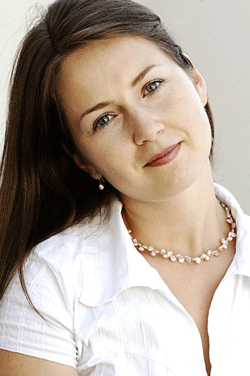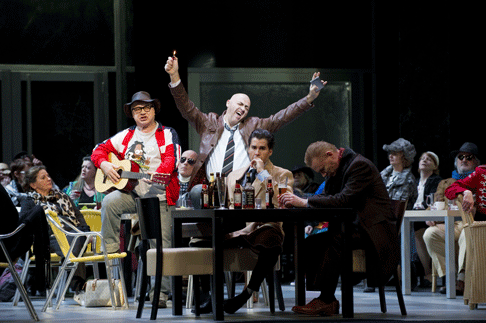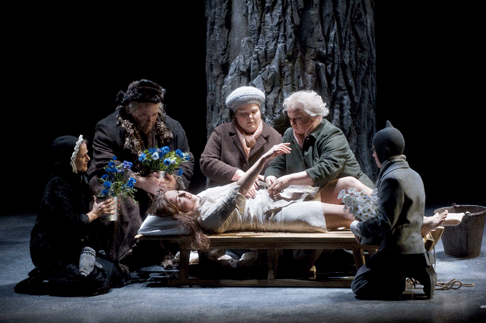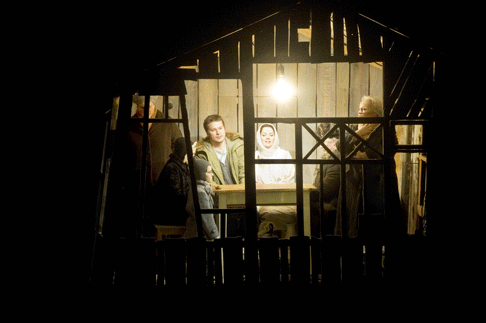Then we burst into delighted applause in appreciation for the evocative
beauty of the realistic woodland, the artistically placed tall dry foliage, the
massively elaborate tree trunks, the scattering of withered late fall flowers,
the raked stage with cozy cabin up the ‘hill’, the eerie mists rising from
the ground’s dampness. Three wooden ladders are placed up that hill evoking
Golgotha. Mysterious. Provocative. Apt. Seldom has a piece begun so favorably
and offered such promise of a legendary evening. And all this before the
downbeat.
 Svetlana Ignatovich [Photo: Theater Dortmund]
Svetlana Ignatovich [Photo: Theater Dortmund]
When conductor Marc Albrecht immediately weighed in, it was clear from the
outset that the Netherlands Philharmonic Orchestra would be on fine form the
entire night, the strings rippling then soaring, the winds burbling then
chirping, the horns playing rhapsodically then introspectively, the trumpets by
turns jaunty and mellow, the large battery of percussive effects making
significant contributions throughout the evening.
Rimsky-Korsakov is a master of orchestral effects after all, and along with
the many exposed solos and textured ensembles come substantial challenges, not
only having to master spare scoring of great delicacy, but to also communicate
edgy, angular dramatic writing, and to evolve at will into downright euphoria.
But this inspired band missed nary a trick. I shall long remember their spunky
rendition of the tumultuous battle interlude with the winds fairly crackling
with brilliance; as well as the long stretches of the last act when lush
strings oozed like melted butter with the harp adding characterful accents, and
the solo violin taking us on buoyant flights of trilling fancy. Albrecht knows
this group of musicians, knows the house, and clearly looooooves him some R-K.
The Maestro managed to unleash a surging and ebbing journey of well-defined
musical moments that melded perfectly into one mighty, arching whole. Bravo,
Mr. Albrecht.
We were perhaps even more fortunate with our heroine Fevronia, who carries
the show. Russian Svetlana Ignatovich was simply ravishing in the title role
(the maiden, not the city!). Ms. Ignatovich was recently honored by
‘Opernwelt’ as Best Young Singer and it is easy to hear why. For she is
possessed of an ample, silvery-yet-warm, effortlessly produced soprano that
encompasses every facet of the demanding vocal writing (and the requirements
are many). At curtain rise we find her basking in the bucolic surroundings, and
her voice takes on a comfortably resigned, conversational quality that
‘speaks’ well in the lower parlando passages. As her love interest blooms,
her maidenly timbre acquires more luster, more pulsing heat, and she builds the
excitement with exceptionally well-calibrated forays above the staff.
Everything is marvelously connected, placement is consistent, the sense of the
phrasing, the dramatic intent, the physicality (did I mention she is very
pretty indeed?) are all splendid.
 Gennady Bezzubenkov as Goeslispeler, John Daszak as Grisjka Koeterma, Morschi Franz and Peter Arink as the noblemen and Koor van De Nederlandse Opera
Gennady Bezzubenkov as Goeslispeler, John Daszak as Grisjka Koeterma, Morschi Franz and Peter Arink as the noblemen and Koor van De Nederlandse Opera
As Ferovnia’s happiness gets detoured and her fate more despairing,
Svetlana summons reserves of (just a bit of) steel to zing phrases out over the
demonstrative orchestra in a dazzling display of dynamic and interpretive
range. In the final act, the composer has one more major hurdle for his
heroine, a lengthy final solo stretch (Immolation crossed with
Capriccio) that encapsulates everything in her arsenal into one final
Mother of All Scena’s (that’s probably ‘Sceni’ but who cares?). If any
convincing were needed that Svetlana Ignatovich is the real deal, the new diva
in town, heiress apparent to many a lirico-spinto part, she won us over in that
final marathon display of exemplary vocalism. Her curtain call deservedly won
her a giddy, uproarious, celebratory affirmation.
Now before I go on, if you do not know the bare bones plot for this piece
(as I did not), I bring you…
Kitezh for Dummies: The maiden Ferovnia lives in a
dense forest, self-exiled for some sorta New Age reasons. During a hunt, Price
Vsevolod stumbles into the scene. He is son to the ruler of Kitezh (think: Oz).
They fall in love and he proposes to her. Subsequently, in a suburb of Kitezh a
carnival-like party is going on to celebrate the arrival of the bride (think:
Mardi Gras). However, two clinically disgruntled citizens (think: Tea Party)
persuade the local curmudgeon Grishka to diss the bride who has now arrived
accompanied by the Prince’s best man, Fyodor. All is terminated by an attack
of blood-hungry Tatars (think: Big Mac Attack but noisier), and the invaders
take Grishka and Ferovnia as hostages. The latter prays that Great Kitezh be
made invisible so the invaders cannot conquer it. Guess what? It vanishes!
(Hope your belief was duly suspended?) Meanwhile in Oz, er, Kitezh, ruler Yuri
prays for his people as he appoints his son commander-in-chief, sacrificing
Vsevelod to battle the Tatars. At this the V-Man proves singularly unskilled,
ending up quite dead quite soon. The hoodwinked Tatars, who can’t see the
city in front of their faces, disperse in frustration. Grushnik goes crazy and
Ferovnia is visited by two helpful birds (think: Abigail van Buren and Ann
Landers) who advise her that a) she will die, and b) become eternally happy.
And, there you have it.
That may not help explain what I write about next, but, well, can it
hurt?
 Svetlana Ignatovich as Fevronja, Jennifer Check as Sirin and Margarita Nekrasova as Alkonost
Svetlana Ignatovich as Fevronja, Jennifer Check as Sirin and Margarita Nekrasova as Alkonost
Having already done himself the big favor of designing an eye-popping set,
in his other role as director, Dmitri Tcherniakov devised a first act that was
a marvel of informative invention. He seemed to view the ambiguous piece as a
ritual, with the natural goodness of the selfless maiden making her a spiritual
leader of sorts. In the clearing at stage center there was a table variously
used as a work space, dinner table, and even suggesting an altar. Here,
Ferovnia tends to the everyday needs of a “family” (extras) that inhabits
the cabin, nurturing and feeding them, dressing wounds, and performing menial
chores. The action was chockful of meaningful stage business and incorporated
fluid blocking that thoughtfully filled out the sketchy story. When the Prince
observed her detailed displays of kindness and devotion, it was this powerful
imagery that won his heart in what would have otherwise been an implausibly
short turn- around time. Tenor Maxim Aksenov not only cut a fine figure as
Prince Vsevelod, but sang with real distinction. His rich, slightly darkened
instrument fell easily on the ear, and his work in the upper regions, although
slightly covered, was secure, pliant, and persuasive. Moreover, Mr. Aksenov and
Ms. Ignatovich wove their way through their duets with insightful musicality
and good vocal contrast.
Bass-Baritone Alexay Markov was another jewel of a performance. His is a
polished, gleaming, virile, responsive bass-baritone of major importance. From
his first notes at the end of One we sat up and took notice. But it was his
extended scene at the opening of Act Three, after he is blinded in battle, that
was to prove one of the musical highpoints of the evening. As Mr. Markov
lurched and stumbled through and among the crowd, he sang with such an
unearthly despair, unbridled passion, and burnished tone that he seemed to also
spur the chorus and orchestra on to their finest, fieriest work of the night.
His was arguably the opera’s most totally engaged performance, musically,
theatrically, he just ‘lived it.’ By the end of the remarkable first act
then, we had heard three superlative soloists and an orchestra firing on all
cylinders; seen one of the loveliest realistic sets in recent memory;
experienced highly detailed character interaction; and basked in a mysterious
aura that was only furthered near act’s end by having the three ‘family
members’ slowly mount the ladders, stretch their arms out, and sway gently,
suggesting what? The Crucifixion? Birds? Wheat? There was also the moody,
expert lighting design by Gleb Filshtinsky. Masterfully calculated washes,
isolated areas, back-lighting, and specials, like the cabin being lit from
within. And when that single overhead cabin bulb was all that was left, in the
waning bars it grew brighter and brighter and brighter
until…blackout.
I was now courting the idea this could turn out to be one of the best things
I had seen in years. I mean, with this abundant talent on display, what could
go wrong? The answer was, unfortunately, Act Two. And then Act Three.
The ‘festival’ open space (or fair ground, or boulevard) that was
expected for the pre-nuptial revelry of the citizenry turned out to be a cafe
in the inner court of an East Bloc monolithic office skyscraper quad. The
chorus was seated, nay trapped at their tables through much of the act. Hubert
Francis rose from their midst and declaimed his lines as the Bear Handler with
great assurance and pleasing tone but he had no bear to handle, nor any real
characterization at all. Who was this guy? Similarly, Gennady Bezzubenkov who
poured out some fine, apocryphal bass phrases as the Gusli Player, held a
contemporary acoustic guitar and didn’t even attempt to fake playing it. He
looked a wee bit like Peter in search of Paul and Mary. The costumes (Elena
Zaytseva and Dmitrti Tcherniakov) were indeed all over the place: jeans, tees,
cheap men’s suits, chinos, day wear, fading hippies, school attire, sun
dresses. Did WalMart have a clearance sale?
Bad guys Bedyay and Burunday are quite indistinguishable (shades of Fafner
and Fasolt!) although Nikita Storojev and Vladimir Ognovenko worked hard to
differentiate them. Both brought their considerable experience to bear and
displayed seasoned bass voices, although both were slow to warm up, finally
coming into their own in their clash in Act Three. It was not their fault their
villainy was drawn in crayon with sneering and mugging so broad it made Snidely
Whiplash seem a model of restraint. As the undermining Grushnik, I had to
admire John Daszak’s pluck and absolute immersion in the unpleasant
character. However, both artist and director badly needed a filter, for the
bloke went beyond merely ‘annoying’ to become a truly hateful figure
combining the worst excesses of Alberich, Hannibal Lecter, and Newt Gingrich.
Think I’m kidding? He was the only real ‘moving target’ in this
crowd-as-living-tableau and he never stopped being obnoxious. Having desecrated
a crucifix by oh, scratching his back with it, swinging it around in a plastic
bag (that he then pulls over someone’s head) and holding it as a phallus and
‘masturbating;’ Grushnik goes on to flip the finger, crawl under tables and
polish shoes, stage a hideous mock seizure, spit on one patron, pour a drink on
another, lie flat on his back petulantly in the middle of various tables, and
too much more to mention. First of all, someone in this ‘hip’ crowd would
have called the Kitezh Kops and had him hauled off. Second, does anyone else
see the problem with a) the blurred focus of the scene which is not just about
him; b) the complete incompatibility of this nonsense with the score emanating
from the pit, and c) making Grushnik so totally repulsive that there is nowhere
for him to go dramatically?
I did appreciate Mr. Daszak jumping in with both feet, but I’m afraid his
was a Herculean effort for little good effect. His straight forward tenor had a
bit of an edge to it, and he used it with great skill if not always great care
as a few over-acted phrases lost pitch or a sense of line. My initial
impression was that John was perhaps a very fine character tenor but his
extensive credits read otherwise. I will reserve full judgment of his gifts for
another time when he is not so immersed in creating a vocal creature of such
unrelenting malintent. While the director’s use of Grushnik was the most
damaging choice in Act Two, it was not helped by the sloppy crowd motion when
the Tatar??s invaded through doors that opened in the upstage colonnade. At
least I think the Tatars invaded. They are certainly supposed to. But it was
hard to tell what was happening, or even who the marauders were until after
some passage of time when several Men-in-Black jumped on the tables after the
crowd had been noisily machine-gunned down. A feeble sputtering strobe light up
right, a super running manically through the littered corpses spraying a fire
extinguisher in the air, and an afterthought of some seriously flaming debris
falling upstage were too little too late in making the massacre visually
viable. The capture of Grushnik and Ferovnia got lost in the mish-mash. As the
curtain fell, the notably subdued applause seemed to mean: “What the hell
happened?”
 Maxim Aksenov as Prins Vsevolod Joerjevitsj and Svetlana Ignatovich as Fevronja
Maxim Aksenov as Prins Vsevolod Joerjevitsj and Svetlana Ignatovich as Fevronja
Act Three’s City of Great Kitezh is set in a makeshift field hospital, set
up in a faded dance hall-cum-auditorium such as can be found in the back of
selected Wisconsin taverns. Of course. That is what Kitezh would be like. Side
bar: In the press kit, Mr. Tcherniakov’s “portrait” says that he
“eschews all superficiality…(he) likes to travel to the place
where the opera is situated in order to soak up the local color.” I guess
Dmitri has been to a drunken Wisconsin Wedding Dance? Or am I being
“superficial”? Back to Act Three’s peeling wallpaper…
After the afore-mentioned thrilling opening with baritone and ensemble,
Vladimir Vaneev put his focused bass in the service of some heartfelt,
plaintive singing as the ruler Prince Yuri Vsevolodovich. The moment he
appointed his son to lead the war was heart-breaking and memorable. As the
Page, Mayram Sokolova was rather dressed as a mother who welcomed her young son
back from the fray. Her clear mezzo was pleasant, but somewhat impersonally
utilized and her portrayal was marred by wild gesticulations. Costumes here
were sort of, well, Amish(?) at first but then as the men prepare for war they
take off their shirts (always a risky visual with an opera chorus) and the
women dress them in white Cossack shirts, then later themselves don white
babushkas. The men having left, the ladies tore velcro’d curtains off the
three stage right windows and observed the battle quite placidly in silhouette
as they drank wine.
The Tatars burst into the room intent on finding Kitezh which was now
“invisible,” although the only suggestion of this was that the women’s
chorus went upstage and silently sat on the “stage” for the rest of the
act. Among the more bizarre costume choices (seemingly inspired by L.L. Bean),
were the inclusion of two Santa Clauses. Yes, Virginia. The rampage is
accompanied by a non-stop flickering neon light, up stage right again. (A
hidden meaning? You tell me.) The “chaos” was almost comical in its
excesses. A pent-up, juiced-up chorister leapt around so hysterically he seemed
straight out of Cool in West Side Story. (“Easy,
Action…”) Slaps and punches were so wide of their marks as to
suggest an ersatz purse fight (and this from a director who eschews all
superficiality). To give the devil his due, as motivation for Burunday to kill
Badyay, Tcherniakov has the latter force Ferovnia to perform (carefully masked)
oral sex on him, filling the avenger with murderous disgust. Refreshing clarity
and honesty in the muddle.
And then…I felt like I had been to Lourdes…for a
Miracle occurred and it was Act Four.
We were once more in a raked, black playing space with five massive towering
trees reaching into the flies. The lighting effects came full circle and there
were once again tightly focused, beautifully wrought specials. After
malevolent-to-the-end Grushnik drags, hits and kicks Ferovnia well in excess of
your average Apache Dance, he mercifully leaves her (and us) alone, and that is
when magic, true Magic begins to happen. First and foremost from here to the
end Svetlana never falters, offering flawless, emotionally tinged vocalizing
that could make angels weep. Her gleaming instrument somehow becomes even
richer, unstinting in her generous, ravishing phrasing. But the staging too
grew in strength, not only recalling the splendors of the first act, but
developing them even further.
As Ferovnia makes life’s ultimate transition, first the cabin is once
again revealed, then a “rescue party” comes in pulling a long sled with a
pillow on it. The two helpful birds (well-served by Jennifer Check’s direct,
laser-like soprano and Margarita Nekrasova’s ripe, baritonal contralto)
assist the maiden in going to sleep on the sled, now serving as a bier that
they pull “home” to the cabin. When they arrive the black backdrop irises
open revealing a golden-orange cyc and, as in the conclusion of the film
Places in the Heart, the loved ones from the past including the
Prince, Ruler, and Page join her in Paradise. Those final ensembles with those
principles and those birds were irresistibly sung. Truth to tell, Nicolai wrote
about twenty minutes more music than was needed. Just when you feel “that was
it, how beautiful” another violin phrase transitions into a retread of music
we have heard before. That said, Mr. Tcherniakov who was nothing but excessive
for half of the evening, found no new invention to fill out that last
repetitious segment, content to allow his principles remain around their
improvised picnic dinner and simply sing marvelously. There was one final good
effect as the blacks stole back in sealing the playing space while Ferovnia
drifted down right and assumed a sort of fetal position in a tightly focused
spot, recalling a similar moment at the opera’s start.
At evening’s close then, I was profoundly grateful to the always top
flight Netherlands Opera for allowing us the opportunity to experience this
seldom heard piece. I was in awe of so much of the musical execution especially
Svetlana Ignatovich who was a revelation. And I came to believe that while
director Dmitri Tcherniakov may more rather enjoy being a Euro Bad Boy, it is
when he is being a Good Boy that his genuine talent emerges. When he is Good,
he is very fine indeed. I would urge him to maintain the splendor of the first
and last acts, and be far more truthful and discerning with the middle. Dmitri
is already onto something ‘good’ here. With some serious refinement, it
could be ‘great.’
James Sohre
image=http://www.operatoday.com/Kitesch_DNO_01.gif
image_description=Svetlana Ignatovich as Fevronja [Photo by Monika Rittershaus courtesy of De Nederlandse Opera]
product=yes
product_title=Nikolaj Rimski-Korsakov: The Legend of the Invisible City of Kitezh and the Maiden Fevroniya
product_by=Prince Yuri Vsevolodovich: Vladimir Vaneev; Prince Vsevelod Yuryevich: Maxim Aksenov; Fevronia: Svetlana Ignatovich; Grishka Kuterma: John Daszak; Fyodor Poyarok: Alexay Markov; Page: Mayram Sokolova; Gusli Player: Gennady Bezzubenkov; Bear Handler: Hubert Francis; Bedyay: Nikita Storojev; Burunday: Vladimir Ognovenko; Sirin: Jennifer Check; Alkonost: Margarita Nekrasova; Lead Singer: Iurii Samoilov; Conductor: Marc Albrecht; Director/Set Designer: Dmitri Tcherniakov; Costume Designer: Elena Zaytseva & Dmitrti Tcherniakov; Lighting Design: Gleb Filshtinsky; Chorus Master: Martin Wright; Extra Chorus (Tatars) Master: Boudewijn Jansen.
product_id=Above: Svetlana Ignatovich as Fevronja
Unless otherwise indicated, photos by Monika Rittershaus courtesy of De Nederlandse Opera